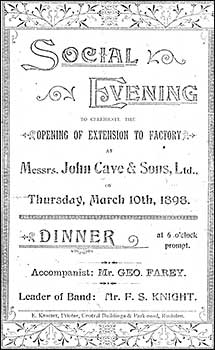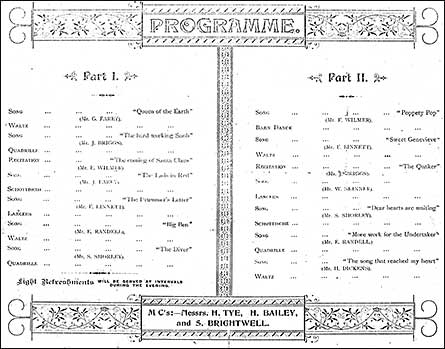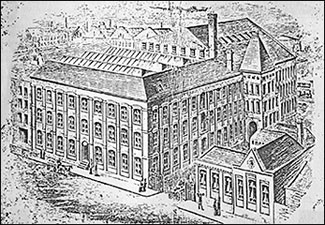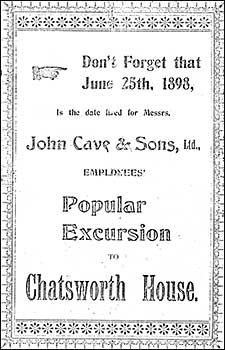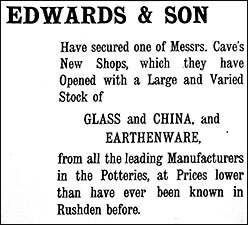|
|
|||
|
John Cave & Sons Limited 1898
|
|||
|
The Rushden Echo, 11th March 1898, transcribed by Kay Collins
Messrs. Cave's Factory Enlargements Completed - Dinner To Employees Last (Thursday) night the completion of the extensions to Messrs. John Cave and Sons' boot and shoe factory, Rushden, was signalized in a noteworthy manner, Messrs. Cave inviting the whole of their employees to dinner, which was served in the new premises. The company, which numbered about 850, included the wives of the workmen and the whole of the men employed in building the new part of the factory, and the dinner, which was served by Miss Cox, manageress of the Coffee Tavern, was the largest which has ever been held in Rushden. The admirable way in which everything went off reflects high credit on Miss Cox and her staff. The tables were prettily adorned with a selection of plants supplied, by Mr. F. Betts, florist, Queen-street. Particulars of the new building will be of interest to our readers. Messrs. Moseley and Anderson, of Northampton, were the architects, and the contractor was Mr. Robert Cosford, of Northampton, the contract price being £7,700. The new premises are designed to accommodate An Additional Five Hundred Workmen and are now practically complete. The whole of the work has been carried out under the supervision of Mr. G. E. Stanton, of Far Cotton, Northampton (Mr. Cosford's foreman), and it is worthy of note that the whole of the work, which was commenced last July and on which 50 men have been engaged, has been carried out with but one single mishap—a man who fell a depth of about 20 feet and who was all right again in a few hours. The painting and glazing has been carried out by Mr. Nichols, of Church-steet Rushden, and the excavating by Mr. W. Willmott, of Rushden. The premises are fitted up throughout with Mr. Ambrose Marriott's patent hot water apparatus. The heating chamber is under the basement, and the boiler is the largest which the builders have ever put in. The basement consists of two rooms, one being 166 feet by 49 feet and the other 166 feet by 34 feet. The former will be used for the rough stuff, and the heavy machinery will be principally placed here, the floor being of solid concrete. The adjoining room, the floor of which is boarded, will be utilized as a store, with carpenterâs shop at one end, and in the future, we understand, currying is to be done on the premises. The basement is lighted from the ground floor by means of Haywood's lights. The ground floor will be devoted to the lasters and finishers. The room is 166ft. by 83ft., and consists of nine spans. Windows at the east end light the room. The top room comprises a large gallery, with a well hole in the centre, which partially lights the ground floor. In the roof are nine spans of north lights, fitted throughout with Deacon's patent glazed sky lights. The southern positions of the spans are slated, consequently there will be No Glare of Sunshine for the workpeople to contend against, although the rooms throughout are brilliantly lit up. The north end of the top storey will be the skin room, and the clickers will have possession of the west side. On each floor there are offices, and leading from each storey is a fire-proof staircase. Lavatories on each floor are fitted up on the latest system, and are shut off from the factory with a separate air passage. Electric lights are fitted up throughout the premises, and the ventilation is perfect. Beyond, question Messrs. Cave have now a factory equal to any in the whole of the district, The Guests Mr. Paul Cave presided and he was supported by Messrs. John Cave (the founder of the firm), Amos Cave, Fred Cave, and Arthur Cave, (partners), J. Cave, Mr. and Mrs. C. Pettit (Harrold), Miss Lowick, Dr. Baker, Dr. Owen, Mr. A. de Sales Turland (Isham), Alderman Spong (Higham), Messrs. F. S. Karn, Ambrose Marriott, Madin, Watson, John Gane (an ex-Mayor of Windsor), Pitt, H Nicholls, and Stanton, P.S. Birrill, and others. Among the chiefs in the various departments were—Messrs. Skinner, G. H. Miller, J. H. Mulrenan, Firman, F. C. Woodward, W. Knight, S. Brightwell, Plackett, C. White, J. Farey, H.Tye, R. Rice, and F. Causebrook, and Miss Allen. The carvers were Dr. Owen and Messrs. Paul Cave, Anderson, Karn, Fred Cave, Arthur Cave, Pitt, Stanton, Tye, Amos Cave, J Smith, J. Watts, Spong, Farmer, Farey, Jolley, W. Abrams, Corby, Thos. Elliott, Nichols, Bailey, Moon, W. Flood, C. Barnes, Birrill, Cross, J. Mackness, Darnell, G. Clarke, Fox, Whiteman, Millicombe, J. Haseldine, H. Willis, T. Palmer, Whitworth, Cave, J. Billingham, G. Smith, Baldry, Cox, Kendall, Smith, Noble, Jerry, Newell, Eady, J. Adams, and Morris. The toast of "the Queen" was proposed by the Chairman who said he was glad Her Majesty’s health was much better than it had been. (Cheers) Mr. Farey proposed “Success to the firm of John Cave and Sons, Limited”. (Applause) It was The Same Old Firm under a new name, and all present wished the firm success from the bottom of their heart. What did this grand building mean? It meant of a lot of employment, and that meant the success of the town at large. (Cheers) Mr. John Cave replied to the toast. He began by asking the company to join with him in singing the verse. "Let us with a gladsome mind The verse was sung heartily. Proceeding, Mr. Cave said he was very pleased to see such a good company of people. He was glad that the workmen had their wives with them that day. The wives would see what sort of a place their husbands had to work in. They had a good light in which to work: after all, there was nothing like sunlight and sunshine, and he hoped they would Take Sunshine Home to their families. (Hear, hear) Then they would be much happier, and the firm would get better shoes made. (Laughter) There were a lot of young people present, who had to fight the battle of life and they must be on the side of temperance if they wanted to fight manfully. Those present had wished success to the film, and now he beggd to wish the workpeople success and health. (Cheers) The Chairman also replied and said they hoped to retain the name of the firm for many generations to come. (Cheers) He sincerely hoped the venture upon which they had started would be successful to the firm and that it would help the town at large. (Hear, hear) If they brought Extra Trade To Rushden it would mean extra work and that meant extra money to be spent amongst the townspeople and also for the improvement of the town. (Hear hear) Their firm most loyally wished to see Rushden prosper. A few years ago Rushden was only a village and they wanted it to go on and improve from time to time. Their ambition was to develop the most modern ways of manufacturing boots and shoes. (Hear, hear) They were putting into these works some of the finest machinery, and he hoped the men would try make the machinery a success. Then they would be helping the town of Rushden and making it known as one of the foremost places for the manufacture of the best boots. The goods made by the firm went to all parts of the civilized world. By the united efforts of employers and employed there was no doubt they could find Plenty of Work to fill that place, and perhaps a larger one. (Cheers) Mr. Cave then proposed “Our Sick and Benefit Club," which was, he said, one of the best institutions that working people could join. With a few pence a week they could provide against sickness. The club was not made compulsory, but it was a dividing club, and if they had not to pay away the money for sickness it was divided at Christmas. With the toast he coupled the name of Mr. Chas. White, the hon. sec. (Applause) Mr. White, in reply, said the club had been a source of help when help was most needed. During the five years he had been secretary they had received £644, about £112 of which comprised Christmas donations. The members had received £308 in dividends and £270 in sick pay and funeral claims. This was sufficient to prove that this was truly a benefit society. He thanks Messrs. Cave for their donations to the club. (Cheers) The Chairman proposed “the Visitors” and referred to the presence of Mr. Gane (the late Mayor of Windsor), who knew something about boot making, Mr. A. de Sales Turland, and Mr. C. Pettit. Mr. Gane, in a witty reply, said he could not wish for a better representation of The Progress of the Industry than what he saw that night. When he was apprenticed to the trade he sat beside men who thought that 12s. and 14s. a week very good wages. Having described how he set out to seek his fortune, he said the same providence which had shaped the course of his friend, Mr. John Cave, had also guided him. He had had the privilege of taking Mr. John Cave round Windsor Castle and seating him In the Queen’s Chair (Applause) Mr. Cave was worthy of it. (Hear, hear) Mr. Turland also replied and said that all Northamptonshire rejoiced in the firm of Messrs. John Cave and Sons. (Cheers) The prosperity of this firm had conduced to the prosperity of the whole county, and had been one of the means of developing this important and rising town of Rushden. (Cheers) The enterprise in the Cave family in matters of business was the spirit which should be emulated by the employees, and, under those circumstances, with the employees doing their part there were no limits to the prosperity of the firm. Mr. Paul Cave was going away and they all wished him a safe and prosperous voage and an early return to those who esteemed him. (Cheers) Mr. Cave was going abroad in the interests more of the employees than himself. He was going to develop and Consolidate the Business of the firm, and that meant continuous employment for the workmen. Those employed in the boot industry could never find continued work if they confined themselves to the United Kingdom. They had to look to markets far away. He hoped the British Empire would maintain her commercial supremacy because that was the secret of the prosperity of Britain. (Hear, hear) That gathering was an evidence of the good relations which existed between employer and employed. Strained relations would diminish the chances of the firm against America, Belgium, and Germany, who were competing for The Colonial Trade At present cheapness characterised the German productions, artistic merits those of France, and solidity and quality those of England. If they could combine the three they would ensure their own prosperity and the well being of Rushden. (Cheers) Mr. G. S. Mason proposed the “Press” and Mr. Cross (Rushden Echo) replied. On the motion of Mr. H. Tye, seconded by Mr. Skinner, a hearty vote of thanks was accorded to Messrs. Cave for their hospitality. The subsequent proceedings were of a social character, light refreshments being served at intervals. Mr. F. Willmer and Mr. J. Briggs recited. Songs were sung by Messrs. G. Farey, J. Briggs, J. Farey, F. Linnitt, S. Shorley, W. Skinner, E. Randall, and H. Dickens. Dancing was indulged in, Messrs. H. Tye, H. Bailey and S. Brightwell acting as M.C.s. Mr. Geo. Farey was the accompanist, and the leader of the band was Mr. F. S. Knight. A Notable Feature in the function was the attendance of Mr. Daniel Sharp, aged 79, who was the first shoe-manufacturer in Rushden, and for whom Mr. John Cave used to work before starting in business for himself. Mr. Sharp made the first rivetted shoe in Rushden. |
|||
Works Outing 25th June 1898 |
|||
|
click here to see an interactive presentation of the booklet then click Run to view the album Please note that because of the limitations of the software package used, it will at present only display on-line in Internet Explorer, other browsers will download the file to run locally |
|||
|
|
|||
